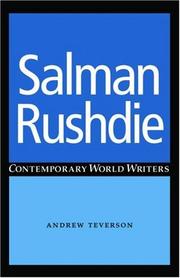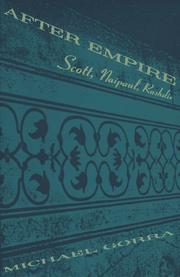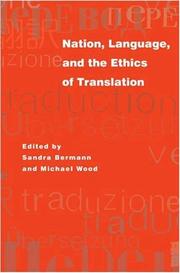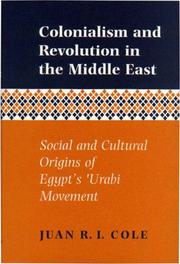| Listing 1 - 10 of 13 | << page >> |
Sort by
|
Book
ISBN: 9782070437122 Year: 1999 Publisher: S.L. Editions Plon
Abstract | Keywords | Export | Availability | Bookmark
 Loading...
Loading...Choose an application
- Reference Manager
- EndNote
- RefWorks (Direct export to RefWorks)
Book
ISBN: 1441144358 9781441144355 Year: 2013 Publisher: London New Delhi New York : Bloomsbury,
Abstract | Keywords | Export | Availability | Bookmark
 Loading...
Loading...Choose an application
- Reference Manager
- EndNote
- RefWorks (Direct export to RefWorks)
Salman Rushdie's writing is engaged with translation in many ways: translator-figures tell and retell stories in his novels, while acts of translation are catalysts for climactic events. Covering his major novels as well as his often-neglected short stories and writing for children, Salman Rushdie and Translation explores the role of translation in Rushdie's work. In this book, Jenni Ramone draws on contemporary translation theory to analyse the part translation plays in Rushdie's appropriation of historical and contemporary Indian narratives of independence and migration
Literary criticism --- Salman Rushdie --- Translating and interpreting. --- Übersetzung. --- General. --- vertalen. --- Rushdie, Salman --- Rushdie, Salman, --- Rushdie, Salman. --- Criticism and interpretation. --- Traduction --- Critique et interprétation --- Vertalen. --- Traduction.
Book
Abstract | Keywords | Export | Availability | Bookmark
 Loading...
Loading...Choose an application
- Reference Manager
- EndNote
- RefWorks (Direct export to RefWorks)
Authors, English --- Freedom of speech --- Ecrivains anglais --- Liberté d'expression --- Biography --- Religious aspects --- Islam --- Biographie --- Aspect religieux --- Rushdie, Salman --- Liberté d'expression --- Rushdie, Salman. --- autobiographie --- Salman Rushdie --- fatwa --- Ayatollah Khomeiny --- Les Versets Sataniques
Book
ISBN: 9058261026 Year: 2001 Publisher: Leuven : Davidsfonds,
Abstract | Keywords | Export | Availability | Bookmark
 Loading...
Loading...Choose an application
- Reference Manager
- EndNote
- RefWorks (Direct export to RefWorks)
Islam en het Westen --- Islam moderne denken --- 297 --- Academic collection --- Islam. Mohammedanisme --- wereldgodsdiensten (x) --- 219 --- 217 --- #gsdb3 --- #GGSB: Oosterse religie --- #GGSB: Islam --- islam --- modernisering --- wereldgodsdiensten --- Islam --- Wereldgodsdiensten --- Sociology of religion --- cultuurverschillen --- Islam ; moderne denken --- Oosterse religie --- De Duivelsverzen --- Salman Rushdie --- terrorisme --- Algerije --- fundamentalisme --- de Arabische wereld --- extremistische moslims --- secularisatie --- wereldcultuur --- moderniteit --- de Koran --- muziek --- cultuur

ISBN: 1846153883 1855661209 Year: 2005 Publisher: Rochester, N.Y. : Tamesis,
Abstract | Keywords | Export | Availability | Bookmark
 Loading...
Loading...Choose an application
- Reference Manager
- EndNote
- RefWorks (Direct export to RefWorks)
"A refreshing new interdisciplinary slant on magical realism as an international literary phenomenon emerging from the trauma of colonial dispossession"--Provided by publisher.
Spanish American fiction --- Fiction --- Magic realism (Literature) --- History and criticism. --- Magical realism (Literature) --- Fantasy fiction --- Surrealism --- Magic in literature --- Marvelous, The, in literature --- Realism in literature --- Alejo Carpentier. --- Gabriel García Márquez. --- Magical realism. --- Miguel Ángel Asturias. --- Salman Rushdie. --- colonial dispossession. --- cultural fusion. --- fiction. --- international literary phenomenon. --- literature.

ISBN: 9780719070518 9780719070501 0719070503 0719070511 1847796214 1847791948 1781701229 9781847791948 9781781701225 9781847796219 Year: 2007 Volume: *3 Publisher: Manchester Manchester University Press
Abstract | Keywords | Export | Availability | Bookmark
 Loading...
Loading...Choose an application
- Reference Manager
- EndNote
- RefWorks (Direct export to RefWorks)
Salman Rushdie is one of the world's most important writers of politicised fiction. He is a self-proclaimed controversialist, capable of exciting radically divergent viewpoints, a novelist of extraordinary imaginative range and power, and an erudite, and often fearless, commentator upon the state of global politics today. In this comprehensive and lucid critical study, Andrew Teverson examines the intellectual, biographical, literary and cultural contexts from which Rushdie's fiction springs in order to help the reader make sense of the often complex debates that surround the life and work of
Rushdie, Salman --- 820 "19" RUSHDIE, SALMAN --- 820 "19" RUSHDIE, SALMAN Engelse literatuur--20e eeuw. Periode 1900-1999--RUSHDIE, SALMAN --- Engelse literatuur--20e eeuw. Periode 1900-1999--RUSHDIE, SALMAN --- Rushdī, Salmān --- Rüşdı̂, Salman --- Ruždi, Salman --- Salamāna Raśdī --- Raśdī, Salamāna --- Рушди, Салман --- רושדי, סלמאן --- רושדי, סלמן --- رشدى، سلمان --- Anton, Joseph --- Criticism and interpretation. --- Crítica e interpretación --- British literature. --- Grimus. --- Salman Rushdie. --- Shalimar the Clown. --- controversialist. --- global politics. --- novelist. --- novels. --- politicised fiction. --- postcolonial studies.

ISBN: 0226304760 1299104614 9780226304762 9780226304748 9780226304755 0226304744 0226304752 9781299104617 Year: 1997 Publisher: Chicago, Ill. University of Chicago Press
Abstract | Keywords | Export | Availability | Bookmark
 Loading...
Loading...Choose an application
- Reference Manager
- EndNote
- RefWorks (Direct export to RefWorks)
In After Empire Michael Gorra explores how three novelists of empire-Paul Scott, V. S. Naipaul, and Salman Rushdie-have charted the perpetually drawn and perpetually blurred boundaries of identity left in the wake of British imperialism. Arguing against a model of cultural identity based on race, Gorra begins with Scott's portrait, in The Raj Quartet, of the character Hari Kumar-a seeming oxymoron, an "English boy with a dark brown skin," whose very existence undercuts the belief in an absolute distinction between England and India. He then turns to the opposed figures of Naipaul and Rushdie, the two great novelists of the Indian diaspora. Whereas Naipaul's long and controversial career maps the "deep disorder" spread by both imperialism and its passing, Rushdie demonstrates that certain consequences of that disorder, such as migrancy and mimicry, have themselves become creative forces. After Empire provides engaging and enlightening readings of postcolonial fiction, showing how imperialism helped shape British national identity-and how, after the end of empire, that identity must now be reconfigured.
English fiction --- National characteristics, British, in literature. --- Indic fiction (English) --- Anglo-Indian fiction --- Decolonization in literature. --- Imperialism in literature. --- History and criticism. --- Scott, Paul, --- Naipaul, V. S. --- Rushdie, Salman. --- Knowledge --- India. --- India --- In literature. --- empire, imperialism, colonialism, british, literature, identity, race, salman rushdie, paul scott, vs naipaul, raj quartet, difference, multiracial, binary, england, india, diaspora, migrant, mimicry, midnights children, decolonization, satanic verses, englishness, domestic, nationality, nationalism, nonfiction, novels, politics, history, social change, power, authority, language, control.
Book
ISBN: 2706713305 9782706713309 Year: 2015 Publisher: Paris: Salvator,
Abstract | Keywords | Export | Availability | Bookmark
 Loading...
Loading...Choose an application
- Reference Manager
- EndNote
- RefWorks (Direct export to RefWorks)
Terrorism --- Jihad --- Fatwas --- Islamic fundamentalism --- Freedom of speech --- Arab countries --- fatwa --- Salman Rushdie --- le chah d'Iran --- le premier Etat islamique --- Mahomet et les premiers califes --- les Frères Musulmans --- l'Etat Islamique d'Abou Bakr --- l'Arabie Saoudite --- Europe --- le choc pétrolier de 1973 --- les Ikhwan --- La Mecque --- la famille royale saoudienne --- diffuser l'islam --- centres culturels --- livres --- sermons --- madrassas --- le voile --- le 11 septembre 2001 --- Théo Van Gogh --- censurer les portraits de Mahomet --- Tariq Ramadan --- les caricatures danoises --- la Conférence Islamique --- Hizb ut-Tahrir --- le pogrom du quartier chrétien de Beyrouth --- la France --- l'Occident --- djihadistes en Orient --- Charlie Hebdo --- Raif Badawi --- islamistes

ISBN: 0691116091 0691116083 9786612505591 1282505599 1400826683 9780691116099 9780691116082 9781400826681 9781282505599 Year: 2005 Volume: *1 Publisher: Princeton, N.J. Princeton University Press
Abstract | Keywords | Export | Availability | Bookmark
 Loading...
Loading...Choose an application
- Reference Manager
- EndNote
- RefWorks (Direct export to RefWorks)
In recent years, scholarship on translation has moved well beyond the technicalities of converting one language into another and beyond conventional translation theory. With new technologies blurring distinctions between "the original" and its reproductions, and with globalization redefining national and cultural boundaries, "translation" is now emerging as a reformulated subject of lively, interdisciplinary debate. Nation, Language, and the Ethics of Translation enters the heart of this debate. It covers an exceptional range of topics, from simultaneous translation to legal theory, from the language of exile to the language of new nations, from the press to the cinema; and cultures and languages from contemporary Bengal to ancient Japan, from translations of Homer to the work of Don DeLillo. All twenty-two essays, by leading voices including Gayatri Spivak and the late Edward Said, are provocative and persuasive. The book's four sections--"Translation as Medium and across Media," "The Ethics of Translation," "Translation and Difference," and "Beyond the Nation"--together provide a comprehensive view of current thinking on nationality and translation, one that will be widely consulted for years to come. The contributors are Jonathan E. Abel, Emily Apter, Sandra Bermann, Vilashini Cooppan, Stanley Corngold, David Damrosch, Robert Eaglestone, Stathis Gourgouris, Pierre Legrand, Jacques Lezra, Françoise Lionnet, Sylvia Molloy, Yopie Prins, Edward Said, Azade Seyhan, Gayatri Chakravorty Spivak, Henry Staten, Lawrence Venuti, Lynn Visson, Gauri Viswanathan, Samuel Weber, and Michael Wood.
Translating and interpreting --- Translating and interpreting. --- Vertalen en culturele identiteit. --- Vertalen en cultuur. --- Vertalen en ethiek. --- Vertalen en interculturele communicatie. --- Interpretation and translation --- Interpreting and translating --- Interprétariat --- Interprétation (Traduction) --- Language and languages -- Translating --- Literature -- Translating --- Traduction -- Technique --- Traduction et interprétation --- Traduction orale --- Traduction écrite --- Traductologie --- Translation and interpretation --- Vertaling en interpretatie --- Theory of literary translation --- Translation science --- #KVHA:Ethiek; vertaalwetenschap --- 82.035 --- 418.02 --- Language and languages --- Literature --- 82.035 Literatuur. Algemene literatuurwetenschap--?.035 --- Literatuur. Algemene literatuurwetenschap--?.035 --- Translating --- Translators --- Allegory. --- Allusion. --- Alterity. --- Analogy. --- Author. --- Awareness. --- Censorship. --- Colonialism. --- Comparative literature. --- Cosmopolitanism. --- Criticism. --- Critique. --- Cultural studies. --- Cultural translation. --- Dialectic. --- Dictionary of the Khazars. --- Edward Said. --- Essay. --- Ethnocentrism. --- Eurocentrism. --- Exclusion. --- Foreign language. --- Gayatri Chakravorty Spivak. --- Genre. --- Grammar. --- Hexameter. --- Ideology. --- Imperialism. --- Jacques Derrida. --- Jews. --- Khazars. --- King Lear. --- Language interpretation. --- Latin America. --- Lawrence Venuti. --- Lecture. --- Legal culture. --- Literary criticism. --- Literary theory. --- Literature. --- Magic realism. --- Metonymy. --- Modernity. --- Mr. --- Nadine Gordimer. --- Narrative. --- Nation state. --- National identity. --- National language. --- Negotiation. --- Neologism. --- New Nation (United States). --- Of Education. --- Originality. --- Pamphlet. --- Pedagogy. --- Persecution. --- Philosopher. --- Philosophy. --- Photography. --- Phrase. --- Plagiarism. --- Poetry. --- Politics. --- Post-structuralism. --- Postcolonialism. --- Postmodernism. --- Preface. --- Prejudice. --- Princeton University Press. --- Prose. --- Psychoanalysis. --- Public sphere. --- Publication. --- Rabindranath Tagore. --- Racism. --- Religion. --- Rhetoric. --- Romanticism. --- Routledge. --- Salman Rushdie. --- Subjectivity. --- Suffering. --- Suggestion. --- Synecdoche. --- The Other Hand. --- The Various. --- Theodor W. Adorno. --- Theory. --- Thought. --- Translation studies. --- Translation. --- Understanding. --- Untranslatability. --- Vocabulary. --- Walter Benjamin. --- Western world. --- World literature. --- Writer. --- Writing.

ISBN: 1282457764 9786612457760 1400820901 1400811279 9781400811274 9781400820900 9780691056838 0691056838 140080132X 1400801338 9781400801329 9781282457768 Year: 1993 Publisher: Princeton, N.J. Princeton University Press
Abstract | Keywords | Export | Availability | Bookmark
 Loading...
Loading...Choose an application
- Reference Manager
- EndNote
- RefWorks (Direct export to RefWorks)
In this book Juan R. I. Cole challenges traditional elite-centered conceptions of the conflict that led to the British occupation of Egypt in September 1882. For a year before the British intervened, Egypt's viceregal government and the country's influential European community had been locked in a struggle with the nationalist supporters of General Ahmad al-`Urabi. Although most Western observers still see the `Urabi movement as a "revolt" of junior military officers with only limited support among the Egyptian people, Cole maintains that it was a broadly based social revolution hardly underway when it was cut off by the British. While arguing this fresh point of view, he also proposes a theory of revolutions against informal or neocolonial empires, drawing parallels between Egypt in 1882, the Boxer Rebellion in China, and the Islamic Revolution in modern Iran. In a thorough examination of the changing Egyptian political culture from 1858 through the `Urabi episode, Cole shows how various social strata--urban guilds, the intelligentsia, and village notables--became "revolutionary." Addressing issues raised by such scholars as Barrington Moore and Theda Skocpol, his book combines four complementary approaches: social structure and its socioeconomic context, organization, ideology, and the ways in which unexpected conjunctures of events help drive a revolution.
Social classes --- Class distinction --- Classes, Social --- Rank --- Caste --- Estates (Social orders) --- Social status --- Class consciousness --- Classism --- Social stratification --- History --- ʻUrābī, Aḥmad, --- Egypt --- Aḥmad ʻArābī, --- Aḥmad ʻIrābī, --- Aḥmad ʻUrābī, --- ʻArābī, Aḥmad, --- ʻArabi Pasha, --- ʻIrābī, Aḥmad, --- Ourabi, Ahmad, --- Ourabi, Ahmed, --- ʻUrābī Pasha, --- أحمد عرابي --- عرابي، أحمد، --- عرابي، احمد --- عرابي، احمد، --- عرابى، أحمد، --- History of Africa --- anno 1800-1899 --- Abbasid Caliphate. --- Activism. --- Al-Ahram. --- Al-Mahdi. --- Algerian War. --- Ancien Régime. --- Anti-imperialism. --- Arabization. --- Banditry. --- Before the Revolution. --- Bourgeoisie. --- British Empire. --- Bureaucrat. --- Byzantine Empire. --- Caliphate. --- Capitalism. --- Censorship. --- Central Asia. --- Circassians. --- Colonialism. --- Conspiracy theory. --- Constitutionalist (UK). --- Corporatism. --- Counter-revolutionary. --- Decolonization. --- Despotism. --- Economic interventionism. --- Education in Egypt. --- Egyptian Government. --- Egyptian crisis (2011–14). --- Egyptian law. --- Egyptians. --- Elie Kedourie. --- Emir. --- English Revolution. --- Expansionism. --- Expatriate. --- Extraterritoriality. --- Foreign policy of the United States. --- From Time Immemorial. --- Ideology. --- Imperial Ambitions. --- Imperialism. --- Indian Rebellion of 1857. --- Infant industry. --- Insurgency. --- Intelligentsia. --- International relations. --- Iranian Revolution. --- Jamal ad-Din al-Afghani. --- Jingoism. --- Khedive. --- Labor aristocracy. --- Liberalism (book). --- Liberalism. --- Loan shark. --- Mercantilism. --- Middle East. --- Mirrors for princes. --- Nativism (politics). --- Neocolonialism. --- New Political Economy (journal). --- Newspaper. --- On Revolution. --- Orientalism. --- Ottoman Empire. --- Pan-Islamism. --- Peasant. --- Pogrom. --- Political revolution. --- Politics. --- Poll tax. --- Populism. --- Radicalism (historical). --- Reformism. --- Revolution. --- Revolutionary movement. --- Ruhollah Khomeini. --- Salman Rushdie. --- Sayyid. --- Secularization. --- Social revolution. --- State within a state. --- States and Social Revolutions. --- Subaltern (postcolonialism). --- Suez Canal Company. --- Suez Crisis. --- Tanzimat. --- Tax collector. --- Tax. --- The Imperialism of Free Trade. --- Tyrant. --- Upper Egypt. --- Urban riots. --- Use tax. --- Usury. --- Warfare. --- Westernization. --- Young Turk Revolution. --- Zoroaster. --- Urabi, Ahmad,
| Listing 1 - 10 of 13 | << page >> |
Sort by
|

 Search
Search Feedback
Feedback About UniCat
About UniCat  Help
Help News
News